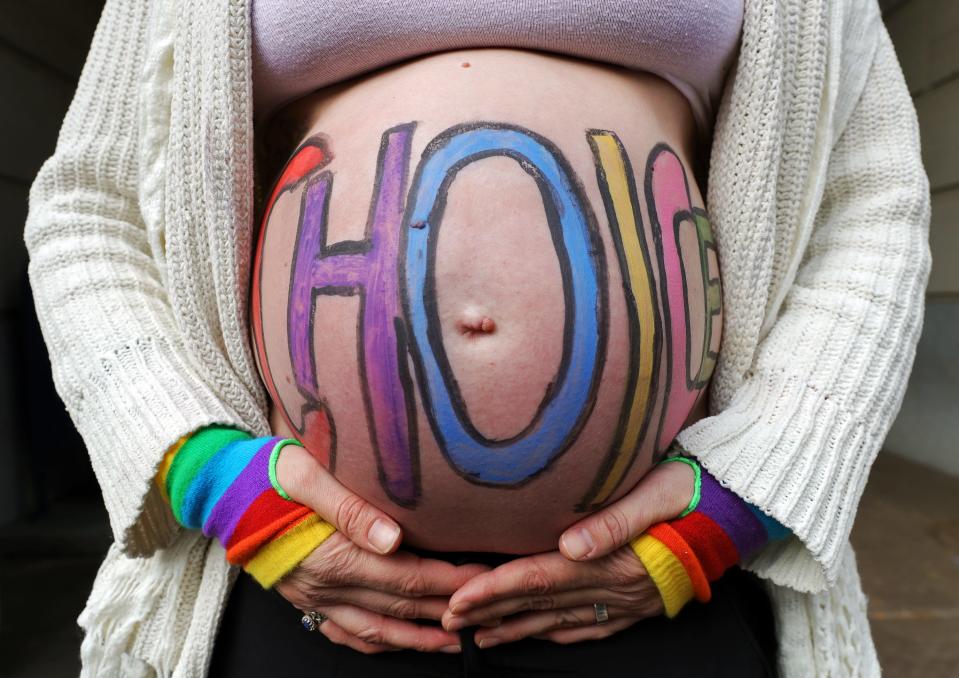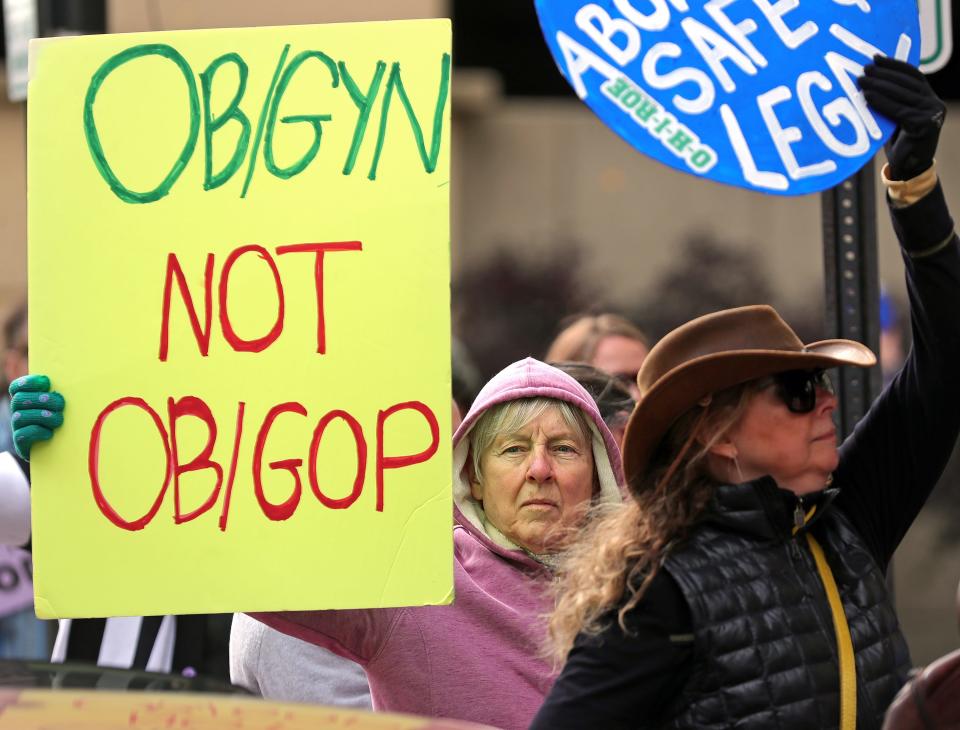'Bans Off' rally in Akron jumpstarts Ohio abortion rights campaign for Issue 1
With the word "CHOICE" painted brightly across her bare and bulging belly, Beth Vild campaigned Sunday for her unborn daughter ahead of Wednesday's start of early voting on Issue 1 — a statewide constitutional amendment for access to abortion and reproductive health care.
“Please make people go to the polls,” said Vild, an activist with the Big Love Network who spoke to about 100 people outside City Hall during a “Bans Off Akron” rally. “I’m having a girl. She needs you. Your children need you. Your grandchildren need you.”
On this chilly and overcast afternoon in October, a second-year Ohio medical student who will not practice in a state that outlaws sexual reproductive care, a retired pediatrician representing 4,000 Ohio doctors and the head of Planned Parenthood Ohio implored the enthusiastic — albeit smaller than they’d hoped for — crowd to mobilize everyone they know to pass Issue 1.
The campaign coordinated by Ohioans United for Reproductive Rights knocked on doors for three hours Sunday afternoon as the ACLU, abortion providers and other member organizations seek volunteers to visit 15,000 Akron homes in the coming weeks.

The Akron event followed a Columbus rally Friday during which droves of abortion opponents surrounded the Ohio Statehouse for their own rally and march.
Many Issue 1 supporters in Akron Sunday were concerned that defeating the other Issue 1 in August, when Ohio voters rejected a GOP-effort to make it harder to amend the state constitution, would confuse the same voters they now need to say yes on Issue 1 in November. One man in Highland Square, an attendee at the rally said, mistakenly put up a "vote no" yard sign, which he quickly replaced with a "vote yes" sign when a neighbor pointed out his mix-up.
Rally organizers and attendees acknowledged that their opposition is unleashing decades of the anti-abortion infrastructure, which culminated last year in a more conservative U.S. Supreme Court of recent Trump appointees overturning the landmark 1973 Roe v. Wade decision.
“On June 24, 2022, the United States Supreme Court said the quiet part out loud and literally left nothing up for guesswork that we had no more rights than we had in I believe it was 1848,” Ward 1 Councilwoman Nancy Holland, the only elected official at the rally, said of the national court decision that’s left it up to states to individually redefine access to abortion.
“Now, do you see a hoop skirt?” Holland snarked about resetting women's reproductive freedom and autonomy to the days of uncomfortable, metal-caged dresses. “I’m not going to stand for this.”
The opposition, some rally-goers said Sunday, are more visible at this point in the fight.
But with a narrow advantage for abortion rights in recent polling, they’re hoping that the unexpectedly high turnout in August will continue through Election Day on Nov. 7. They’re confident theirs is the winning message. But as rally organizer Alana Belle of Planned Parenthood Advocates of Ohio put it, they’re a “little nervous” about voter turnout.
The “Bans Off Akron” rally was held in conjunction with events in Cleveland, Dayton, Toledo, Columbus and Cincinnati as defenders of reproductive rights are kicking into high gear the last leg of their campaign. The fight began more than a year ago when many in the crowd on Sunday helped collection petition signatures for Issue 1, which has, so far, faced lawsuits, an August special election and Republican’s use of “unborn children” instead of “fetus” for the language voters will see on the November ballot.
'The first time that I felt like I owned my own body'
In a crocheted beanie and knit shawl, Vild spoke her abortion story into a microphone.
In her second week of college, she learned she was pregnant. The father in the unplanned pregnancy, a boy from her hometown of Dover in rural Tuscarawas County, was out of work when the factories started closing 20 years ago. And he was “violently verbal with me when he drank,” she said.
“I knew right away that I wanted to have an abortion,” Vild said, pacing back and forth, occasionally staring on the city sidewalk to collect her thought and still her emotions. “I knew this wasn’t the right time to have this kid. I knew this wasn’t the right time for me. And I always wanted to have kids.”
To end the pregnancy, Vild traveled to Cleveland to a now shuttered health clinic. Her sibling joined her bedside during the procedure.
“At the abortion clinic, there was a slew of [anti-abortion activists] right outside the door,” Vild recalled for the crowd. “And growing up in an evangelical Christian town, I had feelings about what I was doing. I knew it was the right decision. But there was still — I felt guilty about it. Right? I felt a lot of shame.”

As the “knock-out” anesthesia began to wear off, Vild walked into a waiting room filled with mostly African American women, a group she’s come to rely on for strength, support and wisdom in her current role as a community activist.
“I was really upset, and each one of those women stood up and gave me a hug and said, ‘Honey, you’re just a baby yourself.’ And that was the first time that I felt like I owned my own body,” she said.
“We cannot go back to when we couldn’t make these critical decisions for our families,” she said.
'My body. My choice.' Campaigning on more than abortion.
The crowd strained to hear the next three speakers after the microphone died. But they didn’t miss a chance to chant their support for Issue 1.
The final rally cry came from Harper, a 10-year-old girl from Akron.
“My body,” she shouted six times into the recharged microphone.
“My choice,” the people answered six times.
“This sucks,” the little girl offered as a closing political commentary on the state of female autonomy.
“It does,” a woman in the crowd replied.
Mostly female and white, rally attendees traveled from across the region, some from conservative strongholds like Norton and Columbiana County, others from blue-collar towns like Barberton that have recently switched to voting Republican in presidential elections.
Courtney Johnson-Benson drove up from North Canton. She listened intently, her pink uterine ear rings dangling, the fallopian tubes on her necklace curling into a pair of extended middle fingers.
“I’ve been committed to reproductive rights my entire life,” said Johnson-Benson, a board member for Planned Parenthood Advocates of Ohio. “When I couldn’t openly talk about reproductive rights to my family, and my friends and to my (Catholic) school, I actually was a patient of Planed Parenthood myself.”
As a girl, she couldn’t go to her family’s physician for birth control. Access to that medicine opened the door to learning about safe sex, breast cancer screening and more. It’s all on the ballot in November, she said.
“It’s ‘abortion and’. And what I mean by ‘abortion and’ is the language of this ballot initiative is more than abortion.” It’s about access to invitro fertilization and miscarriage care.
“If you have a miscarriage and this ballot initiative does not pass, your life could actually be in danger,” she said. “So, it’s not necessarily about just abortion. It’s about being supported in your reproductive health and having the freedom and the choice to make those decisions between yourself and your healthcare provider.”
Opposing sides hone their messages
While the anti-abortion campaign hammers voters with concerns over the unconfirmed impact that Issue 1 could have on parental consent laws for minors, the pro-abortion message is playing up the downside of losing more than abortion access.
Erica Wilson-Domer, president and CEO of Planned Parenthood of Greater Ohio, an abortion and women’s healthcare provider covering the northern half of the state, talked about the life-saving miscarriage care she received 20 years ago.
“We doctors are worried about your health. Really, we are worried about your lives,” said Dr. Arthur Lavin, a retired pediatrician from Cuyahoga County. And “we are very worried about our power to save your lives.”
"Any woman who gets pregnant and has a plain-old miscarriage — and close to a million adolescents miscarriage every year in the United States — and has a common complication like bleeding or infection has to wait for a possible board of trustees to vote on whether a doctor like me can save her life," Lavin said. "We know this is so. We know of women in Texas [where abortion is illegal] with ended pregnancies lying on their bed in hospitals bleeding to death or being eaten up by infection, becoming septic, who literally had to watch their doctors helpless, legally bound not to save their lives until a board took a vote. Some of them lost their uteruses and will never have children.”
Research by the non-partisan KFF and national media have documented legal concerns and hesitation on the part of doctors to use abortion pills for less invasive post-miscarriage treatment.
Reach reporter Doug Livingston at dlivingston@thebeaconjoural.com or 330-996-3792.
This article originally appeared on Akron Beacon Journal: Abortion rights campaign takes message to Akron and Ohio voters

